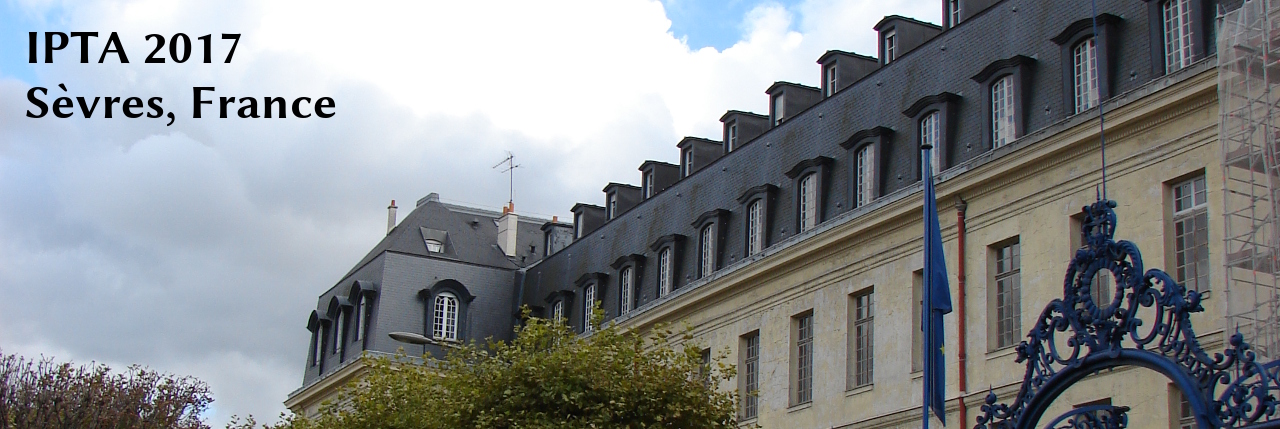
Preliminary Schedule
IPTA 2017 Science Program
Monday 03 July
I. Radio telescopes (09:50 - 11:00) (chair: Ismaël Cognard)
- G.Theureau, Welcome address (10’)
- Delphine Perrodin, Pulsar science at the Sardinia Radio Telescope (15+5’)
- Fronefield Crawford, The Arecibo remote command center network (15+5’)
- Renée Spiewak, Secondary Science with the GBT North Celestial Cap Survey (15+5’)
11:00 – 11:30 coffee break
- Xinping Deng, Observing with a phased array feed at the Parkes Telescope (15+5’)
- Li Di, A Pulsar-Galaxies-MW-FRB Commensal Survey Plan for the Five-hundred-meter Aperture Spherical radio Telescope (15+5’)
- Jingbo Wang, New radio telescope -- QTT 110 meter and Tianma 65 meter radio telescope and Pulsar Timing Array in China (15+5’)
12:30 – 14:20 lunch break
II. Timing data (14:20 - 15:40) (chair: Gregory Desvignes)
- Richard Manchester, PPTA project (15+5’)
- Kuo Liu, Overview and update on the LEAP (15+5’)
- James Mc Kee, new backend generation EPTA data set (15+5’)
- David Nice, NANOGrav overview (15+5’)
15:40 – 16:10 coffee break
- Andrea Lommen, Precision timing with NICER (15+5’)
- Peter Gentile, Polarization calibration of NANOGrav's Arecibo data set (15+5’)
Discussions (16:50-18:00) (chair: Stefan Oslowski)
- DR2 and future datasets, including new PTA contributions (FAST, GMRT, MeerKAT...)
- Cyber-i discussions and a demo (R. Ferdman)
Tuesday 04 July
I. Updates from PTA’s analysis groups (09:30-10:40) (chair: Antoine Petiteau
- Steve Taylor, Update on NANOGrav Data Analysis Methods (20+5’)
- Chiara Mingarelli, EPTA data analysis overview. (20+5')
- Ryan Shannon, Update on PPTA data analysis. (20+5’)
10:50 – 11:20 coffee break
II. PTA vs ephemeris (11:20-12:20) (chair: Nicolas Caballero)
- Stephen Taylor, Gravitational-wave constraints in the presence of solar-system ephemeris uncertainties. (15+5’)
- Joseph Lazio, Solar System Ephemerides, Pulsar Timing, and Navigation. (15+5’)
- Abhinav Jindal, Constraints on Planet Nine and distant solar system objects using Pulsar Timing (15+5’)
12:00 – 14:20 lunch break
III. Search methods and algorithms (14:20-16:00) (chair: Steve Taylor)
- Siyuan Chen, Implications on Astrophysical model selection from the PPTA upper limit. (15+5')
- Janna Goldstein, Sky localisation of monochromatic GW sources in pulsar timing array data using the null stream method. (15+5’)
- Chiara Mingarelli, Detection Prospects of Local Continuous Nanohertz Gravitational-Wave Sources with Pulsar Timing Arrays. (15+5’)
- Naoyuki Yonemaru, New detection method for ultra-low frequency gravitational waves with pulsar spin-down rate statistics. (15+5’)
- Paul Baker, Enterprise: a new PTA data analysis suite. (15+5’)
16:00 – 16:30 coffee break
Discussions (16:30-17:30): (chair: Alberto Sesana)
- Scientific requirements for a detection protocol
- Publication and communication policy
Wednesday 05 July [external attendees, invited reviews]
I. Theory (chair: Gilles Theureau)
- 09:00 Alexandre Le Tiec, General relativistic dynamics of binary black holes
- 09:35 Luc Blanchet, Gravitational waves and the problem of motion in GR.
- 10:10 Eric Gourgoulhon, Black Hole observations and the no-hair theorem
10:45 – 11:15 coffee break
II. experimentations (chair: Stanislas Babak)
- 11:15 Matteo Barsuglia, LIGO and Virgo: status and next steps
- 11:45 Antoine Petiteau, The LISA mission
12:20 – 14:00 lunch break
- 14:00 Bess Fang, Low Frequency Gravitational Wave Detection with Ground Based Atom Interferometer Arrays
- 14:35 Guillaume Patanchon, B-mode measurements with Planck and future missions
- 15:10 Guy Perrin, The GRAVITY VLT experiment and the central BH
15:45 – 16:15 coffee break
III. PTAs : the low frequency end (chair: Andrea Lommen)
- 16:15 Megan De Cesar, The Second IPTA Data Release and Considerations for Future Releases
- 16:50 Michele Vallisneri, Current limits from PTAs and current modeling approaches
- 17:25 Irina Dvorkin, Measuring the stochastic gravitational-wave background from stalling massive black-hole binaries with pulsar-timing arrays
Discussions (18:00-18:45) : multi-messenger information (chair: Andrea Lommen)
19:15 Cocktail-dinner
Thursday 06 July
I. Sources of noise (9:30-10:30) (chair: Caterina Tiburzi)
- Paul Brook, Pulse profile variability in the NANOGrav 11-years data set (15+5’)
- Aditya Parthasarathy Madapusi, Profile variability studies for the PPTA pulsars (15+5’)
- Michael Lam, The NANOGrav 9-year Data Set : excess noise in MSP arrival times (15+5’)
10:30 – 11:00 coffee break
II. ISM effects (11:00-12:00) (chair: Lindley Lentati)
- CaterinaTiburzi, The effect of the Solar wind in low-frequency observations of pulsars (15+5’)
- Megan Jones, Analysis of DM variations in the NANOGrav 9-years data set (15+5’)
- Stefan Oslowski, Probing the extremes of ISM with LOFAR (15+5’)
12:00 – 14:00 lunch break
III. Consortium projects (14:00-15:00) (chair: Kuo Liu)
- Li Guo, A pulsar-based time standard with the International Pulsar Timing Array (15+5')
- Tim Dolch, Analyzing Single Pulses in the J1713 24-hr Global Campaign (15+5’)
- Nicolas Caballero, Planetary ephemeris (IPTA project) (15+5’)
IV. Other projects using PTA data (15:00-15:40)(chair: Kuo Liu)
- Jiang Dong, Build advanced national frequency standard by Pdot of pulsar (15+5’)
- Jingbo Wang, Comparison of pulsar position from timing and Very Long Baseline Astrometry (15+5’)
15:40 – 16:10 coffee break
- Xiaojin Liu, Measuring the second derivative of the spin frequency in precise pulsar timing (15+5’)
- Golam Shaifullah, Spectral indices of MSPs (15+5’)
- Mallory Roberts, X-ray luminosity of pulsars with accurate distances (15+5’)
Discussions (17:10-18:00): (chair: Dan Stinebring)
- new IPTA consortium projects
Friday 07 July
I. New instrumental/numerical/algorithmic developments (9:30-10:30) (chair: Lucas Guillemot)
- Lindley Lentati, Cobra : bayesian approach to pulsar searching (15+5’)
- Keeisi Caballero, The Centre for Advanced Radio Astronomy (15+5’)
- Jing Luo, PINT a new generation of high precision timing package (15+5’)
10:30 – 11:00 coffee break
- Di Li, A database-based pulsar-pulse search pipeline (15+5’)
- Jeffrey Hazboun, The NANOGrav pulsar signal simulator (15+5’)
II. The IPTA Diversity Committee (11:40-12:30) (chair : Delphine Perrodin and Chiara Mingarelli
- TBD, IPTA Code of Conduct / anti-harassment policy
- TBD, Development of interactive sessions promoting diversity-related issues
- TBD, Accessibility of future IPTA meetings
12:30 – 14:20 lunch break
Discussions (14:20-15:20) : (chair: Gemma Janssen)
- PTA observations in the SKA era
- Future instrumentation and future analysis tools